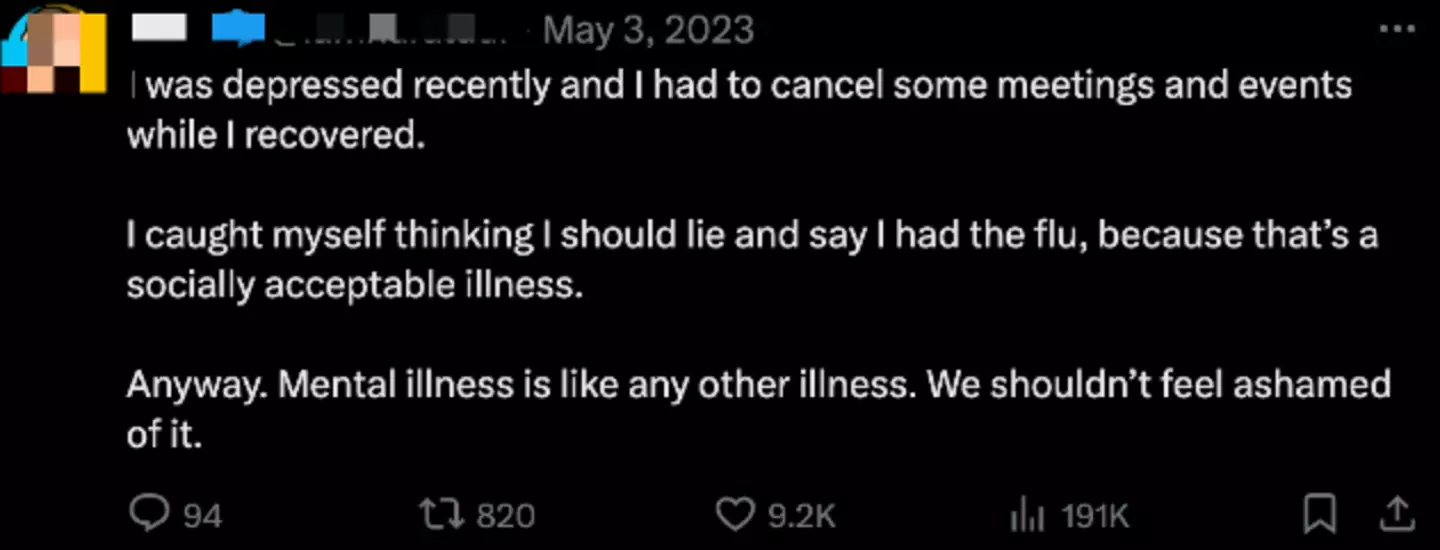
Warning: This article contains discussion of anxiety, depression and other mental health conditions which some readers may find distressing.
Variations of the word 'depression' are still so often thrown about – 'What a depressing day', 'I'm feeling a bit depressed', 'What depressing weather' – often by people who don't have diagnosed depression.
Despite its colloquiality - and the fact mental health conditions such as depression and anxiety are more readily accepted by society - why are so many still reluctant to acknowledge it or to admit to it on a form or application? Why is it still shrouded in such stigma and shame?
Moreover, if people are still so hesitant to admit to their depression on a form, what hope is there for lesser-known mental illnesses more clouded in stigma, like borderline personality disorder (BPD) and schizophrenia?
Advert
UNILAD spoke to Chris Holden - originally for National Depression Education and Awareness Month in the US in 2023 and reprising the article for Mental Health Awareness Week this May 2024 - who works for mental health support organization 42nd Street in Manchester, UK, about why so many people diagnosed with depression still don't admit to it on formal applications.

Before applying for university, I was warned by a family member not to mention my depression or anxiety on the form. Perhaps they feared I would be judged, stereotyped - or perhaps they were concerned I may not even receive an offer at all.
Years later, filling in a form for a new job, I was in a better place and didn't view myself as suffering as badly from depression at that moment in time.
I chose to disclose my 'anxiety,' however, alongside my admittance, I ferociously - and rather ironically - typed three lines about how it was 'under control' and 'nothing to worry about really'.
I still have days where I can't get out of bed, the idea of a shower seems like Everest and I can hibernate for four days straight, too scared to step foot outside my flat. So, why didn't I admit to my depression on the form?

Well, Chris theorizes to UNILAD: "I think there's still a fear [...] it would stop you from getting the job or getting a place on a course, maybe due to someone making an assumption about what you can and can't do."
And he's right. When I was filling in the form, intrusive thoughts scurried through my brain like the spiders in the Forbidden Forest charging at Ron and Harry, fuelled by all the negative stereotypes surrounding depression.
"Will they think I'm lazy? Not as 'strong'? More likely to be flakey? Will they choose someone who appears more 'stable'?"

The UK's Equality Act of 2010 states 'as an employer you are under a positive duty to make any reasonable adjustments in the workplace to alleviate or remove any disadvantage suffered by a disabled worker when compared to a non-disabled worker. This includes anyone suffering from a long-term mental impairment,' according to Davidson Morris.
However, Chris believes the fear of being open about one's mental health on an application is 'born out of some reality'.
He admits: "Some employers still aren't great are they?"
Despite 'approximately 280 million people in the world' experiencing depression, as per a 2023 report by the World Health Organization, and conversations around mental health growing more open, many organizations still haven't fully adjusted.

While Chris acknowledges there's been 'a lot of progress' and 'welcomed conversations' within companies – such as those in the mental health field viewing mental health and experiences as 'attributes' – he admitted there's still a long way to go.
Chris says: "I think there can sometimes be a lack of understanding."
Some schools and workplaces also might 'do a lot around wellbeing' in the form of 'encouraging mindfulness, yoga or tell[ing] people it's good to talk, on the flip side of that', but Chris notes companies might 'not recognise the impact of their role on someone's mental health'.
"They might do all that, but then overlay someone with work, or demand they work longer hours, or not take into account someone's needs like their family life or social needs or health needs or general wellbeing needs. I think it's massively about respect," he reflects.
In England, eight in 100 people during 'any given week' experience 'mixed anxiety and depression', mental health charity Mind previously reported. In 2023, Gallup added: "The percentage of US adults who report having been diagnosed with depression at some point in their lifetime has reached 29.0 percent , nearly 10 percentage points higher than in 2015."
So would it not help for those in higher authority positions at organizations to be honest about their own mental health to, in turn, inspire and support others with theirs?
Chris notes while there's 'definitely something in having people at the top of organizations being able to model talking about mental health issues' and it would be something he encourages for a healthier workplace culture, it can be a 'difficult' one to navigate because it can go 'dangerously the other way, making people feel like it's their duty to talk about their own mental health'.
Also, just because someone has depression, it may not impact all aspects of their life, such as their job being 'the part of your life which you're fine with,' Chris says - so it's about not making 'assumptions' as well.
Ultimately, if you're debating whether or not to acknowledge your depression on a form or to an organization, Chris advises to 'check in with how you feel about it and how you feel about being open about it'.
"It might be that at that moment you don't feel like you're in a place where you're ready to be open about your mental health with an organization you don't know yet. And that's alright. It's okay to let an organization know once some trust has been established," he says.
And you don't always have to the organization as a whole or your boss, but should know you can go to anyone you 'feel comfortable sharing it with'.
Chris resolves: "In an ideal world, I'd be encouraging everyone to open up about their mental health to their employers, but it's that recognition that we're not in an ideal world. It's really tricky, isn't it?
"That's the thing about the conversation to do with mental health, is that we're having it in a context of living in a world which isn't ideal and where bad practices happen. I think it probably does sometimes stop people from getting jobs. It shouldn't happen, but I suspect it does."
Despite depression being the most 'predominant mental health problem worldwide', according to the Mental Health Foundation, people do still discriminate against mental health issues.
Moreover, the 'harsh reality of the situation and system we're under' is that people can't always be picky when it comes to choosing companies who do adequate work to support those with mental health illnesses.
Chris notes the important role unions can subsequently play in aiding relationships between employees and their employers, acting as intermediaries and advocates.
"It would be nice if there was an understanding really that there is this dilemma and it's really hard for people. We know to a certain extent that there's a real benefit to talking to people who we trust about our emotional difficulties or mental health problems. But there's this huge dilemma caused by certain people that it can still be seen as a weakness, with assumptions also made," he said.
And well, if we look at the discourse surrounding UK Prime Minister Rishi Sunak's latest approach to sick leave notes - 'mental health culture' having 'gone too far' in his opinion - it's not hard to see why Chris' words still ring as true in 2024 as when he first sat down with UNILAD in 2023.
And applications for jobs may sometimes exhibit statement which 'say they openly welcome applications from people who might be struggling with their mental health, or that they might label as disabilities' and are inviting the conversation, but unfortunately Chris notes they're still 'often written in quite ableist language'.
"It's very much like, 'We want you to be able to do this, this and this' and talking about how they want you to be able to work under large workloads and timescale pressures. Even now, even within good mental health organizations, they can be written in a way in which doesn't exactly sound conducive to good mental health.
"Why should we all have to adapt ourselves to work with really high workloads, and tight timescales? That's not something I'd advise someone to do in a therapy session."

Chris thinks no job should 'push us to that extent' and that it can be damaging and put off potential applicants who do struggle with their mental health, seeing them discounting themselves almost immediately.
Chris even admitted himself to having been 'slipping' into an easy assumption that those applicants would be considered as not being able to do the job as well. Whereas, 'someone with depression and anxiety might be no less inclined to be able to deal with that, than someone who hasn't gone through that'.
If anything, those with mental health issues could do the job even better, as they could show they can fulfil certain requirements while also dealing with immense personal pressures and battling their own internal battles.
Chris urges everyone - whether employer or employee - to remember 'the vast majority of us go through periods in our life where we might experience what we'd call depression or anxiety'.
Depression was the 'second leading cause of years lived with a disability worldwide', yet it still comes with the heavy weight of stigma when having to admit to it to organizations, universities or on any type of form.
So where does that leave other mental health illnesses? Ones even lesser-known, more stigmatised and which subsequently hold even more fear to admit?
"Yeah, I do worry about that. And I imagine stats would bear out that it was a real worry too, especially for those with the other diagnoses. And some of that might be about people not feeling ready to enter the workplace, but some of it might be to do with presumptions and stigma around those diagnoses as well," Chris says.
He notes: "There might be parallels for those with physical disabilities as well, and just not being able to access certain types of employment. And I do think that it's on employers to be flexible."
Chris concludes employers need to be adaptable, 'not just because it's the right thing to do, but to get the best workforce possible really'.
"Otherwise, you're missing out on talented people who happen to have certain things that are difficult in their life."
42nd Street is an inclusive, accessible mental health and wellbeing support network which offers confidential and free services to young people. You can contact them via their website or email, and you can follow them on X, Facebook and Instagram.
If you or someone you know is struggling or in crisis, help is available through Mental Health America. Call or text 988 to reach a 24-hour crisis center or you can webchat at 988lifeline.org. You can also reach the Crisis Text Line by texting MHA to 741741.
Topics: Mental Health, World News, Politics, Health